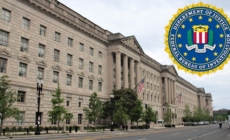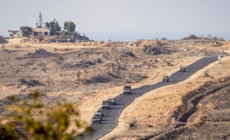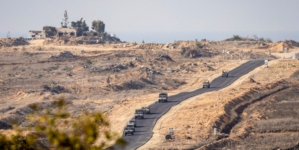-
Fox News AI Newsletter: FBI’s new warning about AI-driven scams that are after your cash - 12 mins ago
-
2024 CFP odds: Back Under in Penn State-Notre Dame, Irish to win outright - 16 mins ago
-
Rolls-Royce to Triple Its Footprint With $370 Million Investment - 35 mins ago
-
Bodies of Israeli father and son hostages found in Gaza - 50 mins ago
-
Amazon’s winter sale: update your home’s look with these furniture deals - 54 mins ago
-
Raging Palisades fire destroys high school featured in multiple Hollywood films - 57 mins ago
-
5 NASCAR storylines to watch in 2025: Kyle Busch’s future, Denny Hamlin’s title quest - about 1 hour ago
-
Microsoft Will Combine Xbox and Windows Experience for Handheld PCs This Year - about 1 hour ago
-
NFL All-Rookie Team: Phenoms Jayden Daniels, Brock Bowers headline our squad - 2 hours ago
-
Possible Sunken Worlds Revealed by High Resolution Models of Earth - 2 hours ago
The West Should Learn From Afghanistan, Delist HTS as a Terror Group, and Establish Relations With Syria | Opinion
In the three years since regaining power, the Taliban has instituted a regime of gender apartheid in Afghanistan. It is the only country in the world where secondary and higher education is forbidden to girls and women over the age of 12. Afghanistan is a disaster, and so is the West’s policy toward it. We should learn from our mistakes, and not repeat them with the new government in Syria.
Washington spent $2.3 trillion in Afghanistan. No less than 2,324 American military personnel, 3,917 U.S. contractors and 1,144 allied troops paid the ultimate price to transform the country into a free and prosperous democracy. Some 70,000 of our Afghan allies did the same.
The Taliban outlasted both the U.S.-led coalition and the Afghan National Army. It is now the de facto government of Afghanistan. Whether the West likes it or not, a terrorist group we spent decades fighting against now controls the political and economic destiny of at least 43 million people.
Leo Correa/AP Images
The West lacks the political will to remove the Taliban from power for a second time. But it can’t engage with the de facto Afghan government, let alone influence or shape events on the ground, because the Taliban is still designated as a terrorist group. This political designation seems incompatible with the objectives we want to achieve in Afghanistan.
Since the West relies on mediators like Qatar to communicate with the de facto Afghan government, our intelligence gathering capabilities and counter-terrorism operations have developed blind spots for Afghanistan-based terrorist groups such as Islamic State Khorasan Province. Yet wasn’t our failure to monitor Al-Qaeda in Afghanistan one of the reasons we invaded that country in the first place?
Hayat Tahrir al-Sham (HTS) is also listed as a terrorist group. Though skepticism is warranted, HTS spent more than half a decade embracing pragmatism. This includes abandoning transnational jihadism, forming the Syrian Salvation Government, building a broad coalition of opposition factions, moderating its social agenda, and dismantling Al-Qaeda and ISIL cells in Idlib province.
The West missed an opportunity to establish relationships, gather intelligence, and develop a comprehensive counterterrorism strategy with Idlib-based factions because of HTS’ designation as a terrorist group. This is also at least partly why we were wrong in our approach toward Bashar al-Assad during the final years of his regime.
Turkey did not make that same mistake. Hence why Ankara, not Russia or Iran, is now the main power broker in Syria—and one of the most important actors in the Middle East. Not only will Turkey lead reconstruction and refugee resettlement efforts, but it is also likely to take an active role in the de-Baathification of Syria. Namely, by training and arming the Syrian army according to NATO standard.
HTS is far from perfect. After nearly 14 years of war, however, it clearly controls most of Syria—and therefore the economic and political destiny of some 25 million people. Delisting HTS as a terrorist group and establishing diplomatic relations with the new Syrian government would provide most Western countries with a permanent presence in Damascus for the first time in more than a decade.
To complement Turkey’s efforts, the West could help the Syrian government with matters related to legal and economic reforms, infrastructure development, truth and reconciliation between various sects, prosecuting war crimes committed by Assad, Hezbollah, Iran, and Russia against the Syrian people, and advising the government as it drafts a new constitution.
The West could also lobby the new Syrian government to enact policies that advance our interests. Chief among these is safeguarding the rights of women and minority groups, ensuring that ISIL detainees in the U.S.-backed, Kurdish-led, SDF-controlled north east of Syria remain imprisoned, and guaranteeing that Russia is permanently expelled from its bases in Latakia and Tartus.
Ultimately, the West must be more pragmatic in its foreign policy by focusing more on advancing our strategic interests and focusing less on political theatre to attract and retain specific blocs of voters. The best time to adopt a more pragmatic foreign policy was yesterday, in Afghanistan. The next best time is today, in Syria.
George Monastiriakos is a part-time professor of law at the University of Ottawa.
The views expressed in this article are the writer’s own.
Source link




























